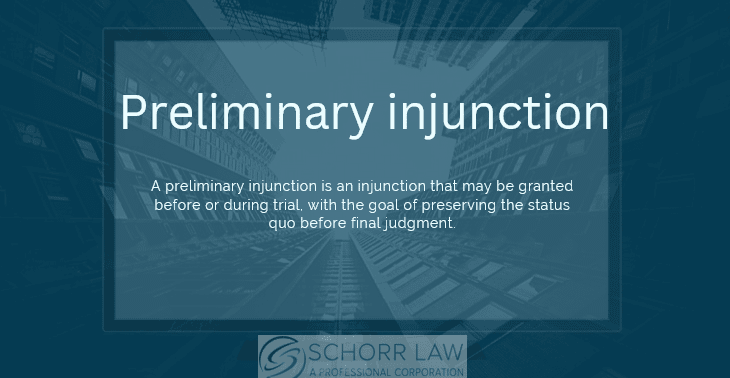Updated on November 1, 2022
In many of our cases we consider bringing a motion for a preliminary injunction. Before actually bring such a motion, however, we analyze the likelihood for success based on the applicable standards for obtaining a preliminary injunction.
Preliminary Injunction Standard
A preliminary injunction is proper where the moving party proves:
- Likelihood that it will ultimately prevail on the merits; and
- That relative interim harm to the parties from issuance of the injunction weights in its favor. Butt v. State of California (1992) 4 Cal.4th 668, 677-678.
“An injunction is a writ or order requiring a person to refrain from a particular act.” Cal. Code Civ. Proc. § 525. Pursuant to Cal. Code Civ. Proc §526, in pertinent part, an injunction may be granted in the following cases:
- When it appears by the complaint or affidavits that the commission or continuance of some act during the litigation would produce waste, or great or irreparable injury, to a party to the action.
- When it appears during the litigation, that a party to the action is doing, or threatens, or is about to do, or is procuring or suffering to be done, some act in violation of the right of another party to the action respecting the subject of the action, and tending to render the judgment ineffectual.”
In deciding whether to issue a preliminary injunction, the trial court should evaluate two factors. “The first is the likelihood that the [moving party] will prevail on the merits at trial. The second is the interim harm that the moving party is likely to sustain if the injunction were denied as compared to the harm that the responding party is likely to suffer if the preliminary injunction were issued.” Metro Traffic Control. Inc. v. Shadow Traffic Network (1994) 22 Cal. App. 4th 853, 858; Universal Life Church. Inc. v. State (1984) 158 Cal. App. 3d 533; IT Corp. v. County of Imperial, (1983) 35 Cal.3d 63, 69.
As the California Supreme Court notes, weighing the relative “equities” is paramount: “By balancing the respective equities of the parties, (the court) concludes that pending a trial on the merits, defendant should or that he should not be restrained from exercising the right claimed by him.” Robbins v. Superior Court (1985) 38 Cal.3d 199, 206. In particular, a party may be enjoined from obtaining funds to which it is not entitled. Mitsui Manufacturers Bank v. Texas Commerce Bank-For Worth (9184) 159 CA 3d 1051, 1057-1058.
It is important to keep in mind that, absent a limited set of exceptions, the Superior Court generally will not grant an injunction where the grounds for seeking the injunction are limited to a party suffering monetary damages.
For help with obtaining an injunction to prevent a harm and to see if you qualify for a free consultation, contact our real estate attorneys in Los Angeles at (310) 954-1877, info@schorrlaw.test2.redblink.net or by using the contact us box on this page.

